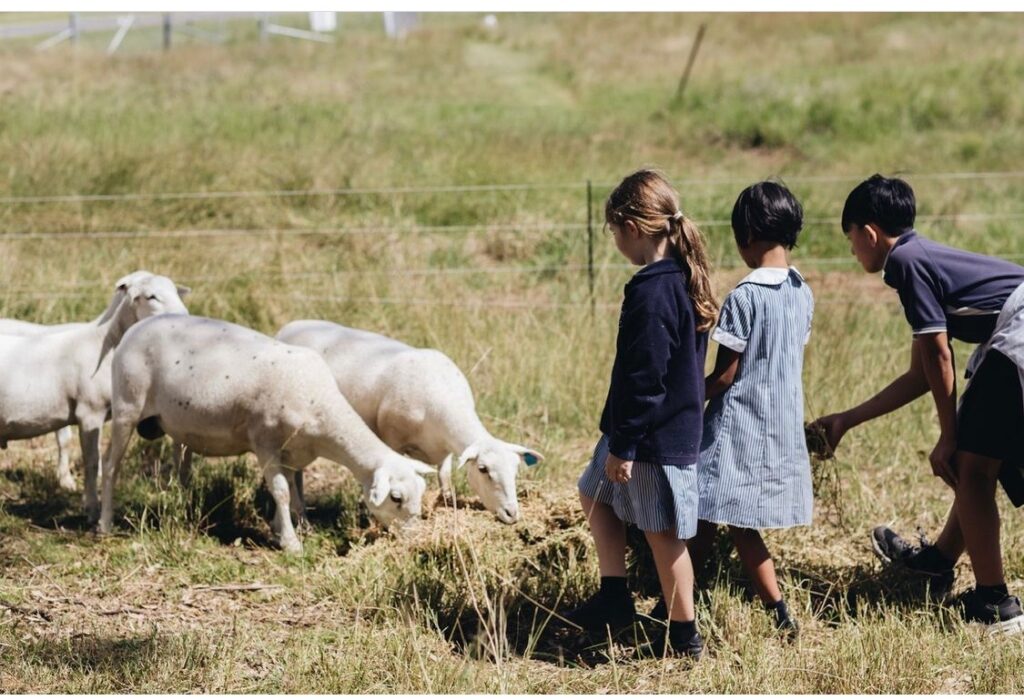A tiny school of three students in NSW has taken sustainability to the next level thanks to a young principal and a supportive community who came together after a statewide drought.
"I wasn't always big on sustainability," Belltrees school principal Shane Roberts told Education Review.
"But I had a reality check coming into a community facing the significant hardships of drought.
"It gave more of a perspective of what we should be and what we could do better."
In 2018, rural regions across Eastern Australia struggled with consistently high temperatures, record high evaporation and below-average rainfall.
The drought was recorded as one of the most significant in Australian history.
Shane remembers it as the "worst drought in the last century", which impacted the community greatly and sparked the school to take on two cattles from a neighbouring farmer.
"We didn't have enough feed to last; we might have lasted a month before we couldn't do it anymore."
He said a conversation with a local at the time pushed him to rethink how to prepare the next generation to deal with climate change and its challenges.
According to the rural principal, his students will likely follow their family members' footsteps and become farmers.
"Farming is a complex career," the 34 years-old principal said.
"How do we prepare future farmers to deal with these different climatic conditions and the difficulties of farming? How do we help them understand the impact of weather events and more?"

One of the first things Belltrees principal did was to refocus the school's agricultural program and look at the "bigger picture" to ensure kids learn the skill sets to thrive in tomorrow's agriculture from the get-go.
As the climate changes, farmers will face more severe droughts and floods over the years, shrinking biodiversity and declining soil fertility.
With the community's help, the school turned towards regenerative agriculture, which improves soil quality and restores biodiversity while protecting water resources.
Regenerative agriculture is also an outcome-based food production system that sustainably enhances farm productivity and profitability.
The school farm has about six sheep and 15 chickens, a vegetable garden, an orchard with more than 50 trees and a series of ponds that provide a sustainable water source for farming and flood/ drought protection.
All the farm production is used through a 'pad to plate' program where students and staff get together every fortnight for a meal.
Shane said the school sustainability journey started with farming before quickly evolving towards a 'net zero' goal embedded in students' learning.
The school has reduced its carbon footprints and water usage and installed solar panels and energy-efficient lights and air-conditioners - a "constant working project", according to the principal.
"Sustainability is a big part of the department's curriculum, and we have this sort of unique playground that they can go on and explore and play while learning.
"The kids identify the problems that they're seeing, and then from the solutions that we come up with, that often leads us into new challenges that we then start that journey again."
For their effort to make Belltrees primary school sustainable, staff and students received multiple awards, including the Green Flag accreditation for their environmental practices, work with the community and sustainability curriculum.
Belltrees is the fifth school in Australia to receive this certification.
"We love that our little small school was able to get some of that statewide recognition and that, that's exciting - we're keen to show that small rural schools can have a really big impact," he said.
According to Shane, working in rural schools offers a plethora of opportunities for teachers and school leaders to make an impact, yet he recognises that Belltrees' sustainability journey was only possible with the school's community engagement.
Still today, parents and local farmers continue to participate alongside kids in different workshops all around NSW to bring back new practices to implement at school.
While he acknowledges that he is very fortunate to have a beautiful landscape as an office, he said a strong focus on student learning is the most important aspect of rural schools.
"In most classroom settings, you would have a child for 12 months before they move on to the next year's grade. In my context, I have had children for six or seven years. You need to be creative."
Shane said he likes to think 'innovatively', always tries to gamify learning to engage its three students during class, and keeps up to date with the latest technology and activities offered by the department.
"We wanted to make sure that they didn't miss out just because they are in a small school."
"We constantly are looking for opportunities to enhance and improve the learning environment, be it outdoors, indoors, or with just different relationships we build with different community groups."
Do you have an idea for a story?Email [email protected]
 Education Review The latest in education news
Education Review The latest in education news

